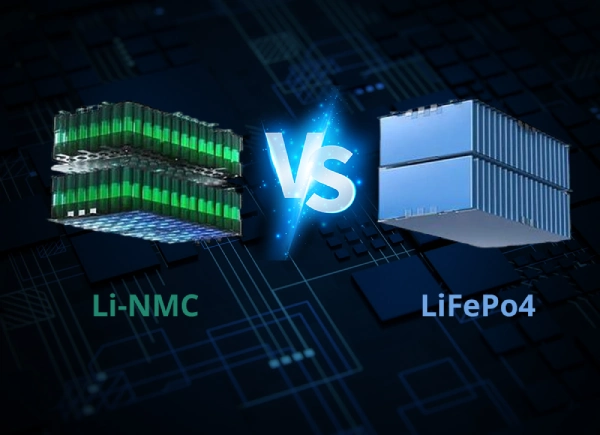The main power batteries are LiFePO4 lithium batteries and ternary lithium batteries. The battery’s performance is directly related to the power output, that is, the performance of the motor. This article will introduce the advantages and disadvantages of LiFePO4 and ternary lithium batteries and which is better. Let’s start!
Part 1. LiFePO4 battery advantages and disadvantages
LiFePO4 lithium battery is a lithium-ion battery using lithium iron phosphate as the cathode material. Lithium iron phosphate electrode material is currently the safest cathode material for lithium-ion batteries. This lithium battery has a moderate operating voltage (3.2V), large capacity per unit weight (170mAh/g), high discharge power, fast charging, long cycle life, and increased stability in high-temperature and high-heat environments.
Advantages of LiFePO4 Batteries
LiFePO4 lithium battery has at least five advantages: safer, longer cycle life, does not contain any heavy metals and rare metals (low raw material cost), supports fast charging, and has a wide operating temperature range.
1. Safety
The safety of the LiFePO4 lithium battery comes from the stability of the cathode material and reliable safety design. Lithium iron phosphate battery packs have undergone rigorous safety testing and will not explode even in violent collisions.
2. Long cycle life
The 1C cycle life of lithium iron phosphate batteries generally reaches 2,000 times or even more than 3,500 times. The energy storage market requires more than 4,000-5,000 times, which is higher than other types of lithium batteries.
3. Good high-temperature performance
The thermal peak of lithium iron phosphate battery can reach 350~500℃, the operating temperature range is wide (-20~+75℃), and 100% capacity can still be released under high temperatures (60℃).
4. Fast charging
The battery can be fully charged at 1.5C in 40 minutes using a dedicated charger.
5. Green and environmentally friendly
Lithium iron phosphate batteries are green, environmentally friendly, non-toxic, non-polluting, have vast sources of raw materials, and are cheap.
Lithium Iron Phosphate Battery Disadvantages
LiFePO4 lithium batteries have some performance defects, such as low tap density and compaction density, resulting in the low energy density of lithium-ion batteries. The preparation cost of LiFePO4 lithium battery materials and the manufacturing cost of batteries are high, the battery yield is low, and the consistency is poor.
Part 2. Advantages and disadvantages of ternary lithium batteries
The ternary lithium battery refers to a battery that uses lithium nickel cobalt manganate (NCM) or lithium nickel cobalt aluminate (NCA) ternary composite material as the positive electrode material. The ternary battery has the advantages of high energy density, high charge and discharge efficiency, and low-temperature resistance. At the same time, high prices and poor safety are the main shortcomings of ternary lithium batteries.
Advantages of Ternary Battery
The ternary lithium battery has high energy density, and the battery cycle life is better than regular lithium cobalt oxide. With the continuous improvement of the formula and the improvement of the structure, the nominal voltage of the ternary battery has reached 3.7V. The capacity has reached or exceeded the level of lithium cobalt oxide batteries.
Disadvantages of Ternary Battery
The ternary lithium battery mainly includes lithium nickel cobalt aluminate battery, lithium nickel cobalt manganate battery, etc. Due to the unstable structure of nickel-cobalt-aluminum at high temperatures, high-temperature safety is poor. And if the pH value is too high, it will easily cause the monomer to bloat, causing danger. Moreover, the current cost of ternary lithium batteries is also relatively high.
Ternary lithium batteries have greater energy density, but their safety is often questioned. This is because even these two materials will decompose when they reach a specific temperature. Ternary lithium materials will decompose at a temperature of about 200 degrees. In comparison, lithium iron phosphate materials will decompose at about 800 degrees. Moreover, the chemical reaction of ternary lithium materials is more violent, releasing oxygen molecules, and the electrolyte burns rapidly under high temperature, causing a chain reaction. Simply put, ternary lithium materials are more likely to catch fire than lithium iron phosphate materials. However, it should be noted that the materials mentioned here are not the finished batteries.
Because ternary lithium materials have such safety hazards, lithium battery manufacturers like Ufine also work hard to control battery quality and safety. Based on the easy pyrolysis characteristics of ternary lithium materials, Ufine will do a lot of work in overcharge protection (OVP), over-discharge protection (UVP), over-temperature protection (OTP), and over-current protection (OCP).
Part 3. LiFePO4 lithium battery vs ternary lithium battery
Affected by the structure, LiFePO4 lithium battery and ternary lithium battery have their advantages and disadvantages in terms of performance. The ternary battery has advantages in energy density and fast charging speed. In contrast, the iron phosphate battery has cycle life, safety, and economy advantages.
1. Cathode material
The two batteries’ negative electrode, electrolyte, and separator are similar. The most significant difference is the positive electrode material.
2. Energy density
From a cell perspective, ternary lithium batteries have higher energy density. Lithium iron phosphate cathode material’s rated voltage and theoretical specific capacity (mAh/g) are lower than those of ternary batteries.
3. Charging efficiency
The ternary battery has significant advantages over the LiFePO4 lithium battery in terms of charging efficiency. When setting below 10C, there is no noticeable difference in the constant current ratio between the ternary and LiFePO4 lithium batteries. When charging at a rate above 10C, the continuous current ratio of the LiFePO4 lithium battery decreases rapidly, and the charging efficiency decreases quickly.
4. Cycle life
Theoretically, the LiFePO4 lithium battery has advantages in lifespan. Its olivine crystal structure is more stable, with lower expansion and more stable electrochemical reactions.
5. Security
LiFePO4 lithium battery has unparalleled safety advantages. Its positive electrode voltage is low, no oxygen-releasing thermal chain reaction is similar to ternary, and the thermal stability temperature can reach more than 300°C. In contrast, the ternary lithium battery is around 150-200°C.
6. Economical
In terms of price, the LiFePO4 lithium battery currently has apparent advantages. The raw materials are relatively cheap, and the industrial chain is more mature. Cobalt is the key if you want to reduce the price of ternary batteries. Cobalt is mainly an associated mineral with small output and uneven distribution. In recent years, the price has continued to rise.
Part 4. Final thoughts
The advantage of the LiFePO4 lithium battery is that it can withstand temperatures of 350-500 degrees and is safer. The cycle life is more than 2000 times, and the service life is longer. Because it does not contain precious metal materials, it is rich in phosphorus and iron resources, and the cost of raw materials is low. It is about 200 yuan lower per kWh than ternary lithium batteries. The stability is the best among power batteries.
Of course, the shortcomings are also undeniable. The consistency of the LiFePO4 lithium battery is not as good as that of a ternary battery. The central performance is in power output. The low-temperature performance could be better than that of ternary lithium batteries. At minus 10 degrees, the activity and battery capacity decrease. The ternary battery can be used in an environment of minus 20 degrees. But at 25-50 degrees, the two batteries have almost no difference.
FAQs
-
What are the disadvantages of ternary lithium batteries?
Disadvantages of Ternary Lithium Batteries: Ternary lithium batteries have lower thermal stability, shorter cycle life, higher production cost, and increased risk of thermal runaway compared to other lithium battery types. -
What are ternary lithium batteries?
Ternary lithium batteries, also known as lithium nickel cobalt manganese oxide (NMC) batteries, are a type of lithium-ion battery that uses a ternary cathode material composed of lithium, nickel, cobalt, and manganese. -
What are LiFePO4 lithium batteries?
LiFePO4 lithium batteries, also known as lithium iron phosphate batteries, are a type of lithium-ion battery that uses a cathode material composed of lithium, iron, and phosphate. -
Are lithium phosphate batteries better thanternary lithium batteries?
LiFePO4 lithium batteries have safety, cycle life, and thermal stability advantages. Ternary lithium batteries offer higher energy density and power output.
Related Tags:
More Articles

LiPo Battery Discharge Rate Guide & Calculation Tips
Understand LiPo battery discharge rates, C-ratings, and how to calculate max current. Essential guide for RC, drones, and electronics users.
High‑Capacity 3S LiPo Batteries: 5000 mAh vs. 10000 mAh
Compare 3S LiPo 5000mAh vs 10000mAh batteries by weight, power, and use. Find the best fit for your drone, RC car, or boat setup.
Top 5 Applications for Small 3S LiPo Batteries
Small 3S LiPo batteries power drones, RC gear, wearables, and robotics with high energy and low weight. Making them ideal for compact electronics projects.
Building and Charging Your Own 3S LiPo Pack: A Step‑by‑Step Guide
Learn how to build, balance, and charge a 3S LiPo battery pack safely at home with this complete DIY guide for hobbyists and beginners.
How to Choose the Right LiPo Battery Plug Type?
Discover the best LiPo battery plug types, how to choose them, and expert tips for safe usage, soldering, and maintenance.




